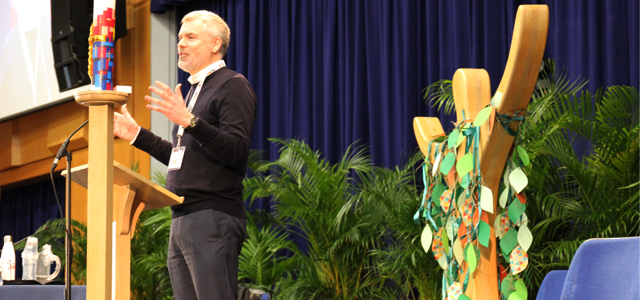Identity is important. And it is fair to say the Uniting Church has spent a disproportionate amount of its energy on the question of its identity, Rev. Peter Walker has told the final day of The Living Church – Synod 2019.
Rev. Walker, in his third devotions, spoke about the power of identity in his study, “The Identity of the Living Church”.
“Among the more interesting political twists in recent times were the two electoral surprises of 2016: Britain’s vote to leave the European Union (Brexit) and the election of Donald Trump as President of the United States. In both cases, the politics of identity was central,” he said.
Rev. Walker said identity was also a powerful and important issue for the church.
“Sometimes our unity is stretched and, when stretched, we begin to question our identity. I think it would be fair to say the Uniting Church has spent a disproportionate amount of its energy on the question of its identity. How shall this new church be identified? It has, at times, been exhausting,” he said.
He said in writing to the church of Philippi, Paul was tackling a problem of identity and division (Phil: 4: 2-3). Paul’s response to a practical problem is a big answer.
“Paul seems instinctively to have known that all issues in the Christian community are theological; and that the search for a solution to any difficulty is always helped by the delivery of good theology,” he said.
Paul saves for the Philippians his best example of good theology delivered to solve a practical problem; the beautiful Christ hymn we heard this morning. Are you in conflict and unwilling to be reconciled? Are you identifying yourself with this or that person? This or that group?
Let the same mind be in you that was in Christ Jesus who, though he was in the form of God, did not regard equality with God as something to be exploited, but emptied himself (2: 5-7a).
Rev. Walker said one of the earliest names bestowed upon Jesus was a form of Christian confession: Jesus is Lord. (Romans 10.9; Acts 2.36).
“And that Lordship is not confined to this human realm; to this ‘existence’. Christ is Lord of that which exists before, that which exists now, and that which is to come after. Every knee shall bend, in heaven and on earth and under the earth – in other words, in all times and throughout all places – and every tongue confess that ‘Jesus Christ is Lord’,” Rev Walker said.
“It is vitally important, amid all the imagery of glory, to stop and notice that the central event in this drama is an act of humble service. The centre of this hymn is also the centre-point of God’s reconciling grace, poured out for the whole creation.”
Rev. Walker said the purpose, the focus, and the identity of the living church was not about us.
“They are all about the living Lord; whose gospel is our purpose, who is the focus of our unity and who, when we allow the same mind to be in us – when we are minding Christ – becomes our identity,” he said.
“Our calling is to bear witness to Jesus Christ who, in his own strange way, constitutes, rules, and renews [us] as his Church. Then, by his grace, we become the living church.”
Rev. Walker closed with a prayer by St Benedict (480-543):
Grant us, O God, a mind to meditate on you, eyes to behold you, ears to listen for your word, a heart to love you, and a life to proclaim you; through the power of the Spirit of Jesus Christ our Lord. Amen.
Questions for Reflection
Read Philippians 2:1-11 after viewing “The Identity of the Living Church”
- Look again at the section of the study under the sub-heading ‘Paul’s solution – good theology’. Paul addresses the problems in Corinth and Philippi with reminders of the one who unites Christians – the living Lord. Where is your church community looking for solutions to its problems? And the wider church?
- The study seeks to broaden our sense of the phrase ‘Let the same mind be in you’ (Phil 2:5) so that we may grasp Paul’s original intention. ‘Minding’ is a doing thing at least as much as having a particular ‘frame of mind’. Do you find this analogy helpful? If so, which gifts do you bring to the calling of ‘minding Christ’?
- It is life-giving to know we have a personal relationship with a God who reaches out to our inner self, yet our identity is vested in something greater than the inner self, or our favoured group. What is your identity? How has your identity been formed – and continues to be formed?
- “There is no more ‘us or them’. There is not even ‘us and them’. There is only we, in Him.” Is this achievable or just nice-sounding theology? Give some thought to any biblical passages, characters, or stories that come to mind as you read over this statement.
- The identity of the living church is found in our living Lord. How might you, your church community, and the Uniting Church in Australia become more closely identified with Christ?
Rev. Peter Walker with additional reporting by Martin Thomas













